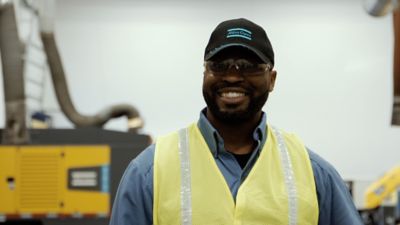Should I Repair or Replace My Air Compressor?
I'm trying to figure out whether I should repair or replace my air compressor. Any tips?
Cost is the primary consideration, both immediate and over time. Keep in mind that the actual purchase price of the new compressor is only around 10% of the overall cost! Other factors include the age of the compressor; its energy efficiency compared with newer models; and its former repair history and overall reliability.
Determining when to make repairs on an air compressor and when to purchase a new air compressor can be difficult. An air compressor is a long-term investment, so a smart buying decision starts with asking the right questions. You need to find out up front what costs you will really incur over the life of your investment.
A good rule of thumb to follow is that if the necessary repairs exceed 50-60% of the cost of a new compressor, it may be time to replace the compressor rather than focus on repairs. The reason is simple: critical air compressor parts can cost a substantial amount to replace! For example, if your air compressor needs a new airend element and a new motor, it will typically cost less to purchase a new compressor, rather than replace these critical parts.
One other reason to consider replacing a compressor is its age, especially if the compressor is over ten years old. This isn’t to say that your older compressors needs replacement! If your original investment was a quality compressor that has been kept on a consistent maintenance schedule, there is a very good chance that it will remain fully functional and efficient for years to come. However, there have been many strides made in compressor technology over the past decade – which means that if you invest in a new machine, your energy costs saved per month might outweigh the initial, upfront investment.
Troubleshooting Tips for Broken Compressors
Your compressor may have broken down for any number of reasons, and not all of them are indicative of irreparable damage. Things that you or your maintenance staff might be able to check include:
- Power Source. Is there something else in the system between the compressor and the power supply that may have caused the compressor to fail?
- Oil Levels. When was the last time you checked and adjusted your compressor’s lubricant levels?
- Excessive Noise. Unusual noises while the compressor is running could indicate problems with bearings, flywheels, belts or crankcases.
- Excessive Oil Consumption. This can indicate worn piston rings, poor or restricted air ventilation or loose bolts, all of which can be corrected with minor adjustments or replacements.
- Excessively Hot Discharge Air. This usually means a problem in your cooling system, which may need to be repaired or increased in capacity.
- Excessive Belt Wear. This is usually caused by belts being too tight or too loose or out of alignment. If you can make such adjustments yourself, you will save on repairs.
- Regularly Blowing Fuses. This could be because they are not the right size for the electrical load of your compressor. Replacing them with the correct size may be all that is required.
New Compressors are Expensive – Right?
Yes, new air compressors may seem to carry a hefty price tag at first. But when factoring in energy savings, possible energy credits from your electricity provider, increased reliability, and decreased maintenance costs, the payback time is often shorter than you think. Initial cost also doesn’t take into account the potential devastating costs down the road that are associated with downtime due to compressor shutdowns.
Calculating the life cycle cost of the air compressor prior to purchasing new equipment is a smart way to analyze the total investment. Plus, a life cycle cost evaluation can also be used as a comparison tool when vetting other products and systems; to help define other important requirements for the installation and help assess potential environmental, energy-saving and increased production quality demands; and to reveal areas where energy efficiency can be improved.
I Think I Need a New Compressor. How Do I Find the Right One?
Here is one thing to consider: what you save on the initial purchase price of a compressor today might lead to greater costs down the road. Ask yourself the below questions when determining if a new compressor purchase is the right decision for your business:
- What’s my reason behind purchasing a new compressor? Maybe you need a better control system so your compressors work together more efficiently. Maybe you need an air receiver or some piping changes. Ask a compressed air expert to look over your air system carefully. They can help you determine what exactly about your system needs to be replaced or upgraded!
- What is the compressor capacity in cubic feet per minute, delivered, per brake horsepower, at the pressure required? This is the measure of compressor efficiency. Remember, energy (not equipment) is the biggest single cost component of compressed air. You need to know how much air you get at the pressure you need, and how much energy it takes to get there. Find out if a Variable Speed Drive compressor can benefit your air system. VSD compressors continuously adjust compressed air output to match production line demand. In many applications, VSD significantly reduces energy consumption. But not all VSD compressors are the same. Only a system designed and manufactured as VSD from the ground up can provide optimal performance in all situations.
- Do I have an estimate of all life-cycle costs, including energy and maintenance, for the new compressor? As mentioned earlier, the first cost component is the equipment invoice - but the much more significant cost for an air compressor is the energy it uses month after month for its entire operating life. Compressors that use less sophisticated technology consume more energy. Maintenance costs should be examined carefully as well, given that some compressors are designed to be maintenanced twice as frequently as others!
Still struggling on whether or not you should repair or replace your existing compressor? Our compressed air experts are ready to help! Give us a shout below.



